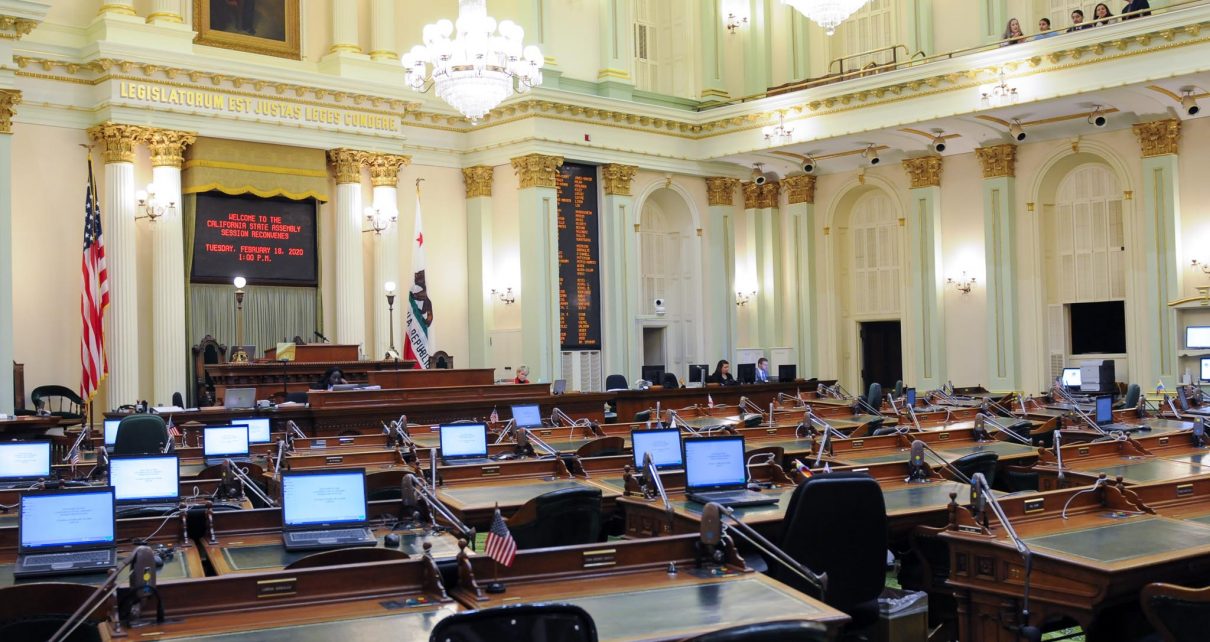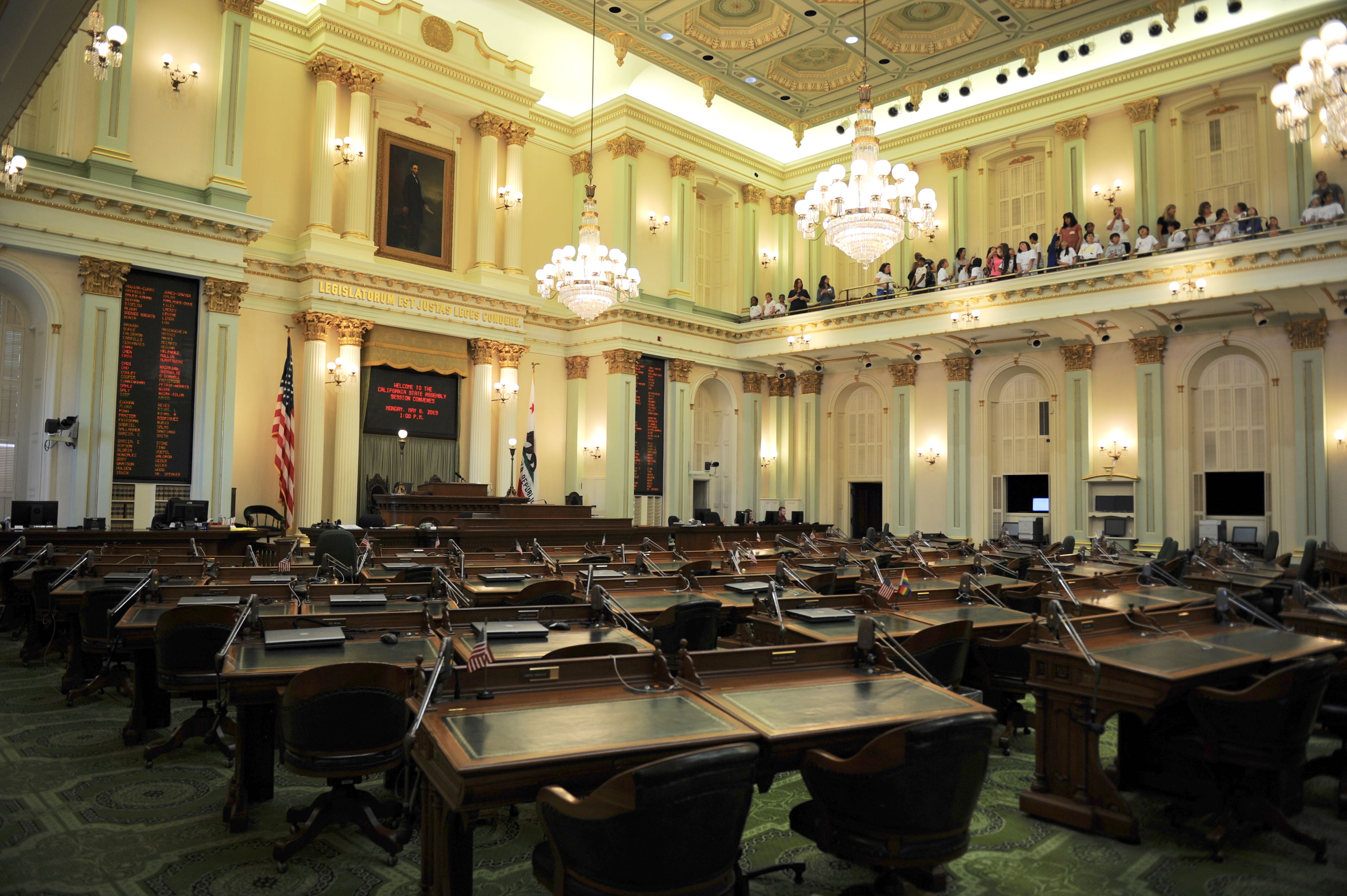
California State Assembly. (Photo: Kevin Sanders for California Globe)
Assembly Modifies Its Internal Rules
The State Senate did not adopt its Senate Rules on December 7, but is expected to do so in early January
By Chris Micheli, December 7, 2020 3:58 pm
On the day of its Organizational Session, December 7, the California State Assembly adopted along a party-line vote House Resolution (HR) 1 by Assembly Member Ken Cooley. HR 1 contains the Assembly Rules (AR) for the 2021-22 Legislative Session. The following are some of the changes that were made by HR 1 to the prior version of the Assembly Rules that applied during the 2019-20 Session.
Standing Committees
AR 11. Thirty-three standing committees of the Assembly are hereby created, upon the several subjects, and titled respectively, as follows:
Accountability and Administrative Review
Aging and Long-Term Care
Agriculture
Appropriations
Arts, Entertainment, Sports, Tourism, and Internet Media
Banking and Finance
Budget
Business and Professions
Communications and Conveyance
Education
Elections
Emergency Management
Environmental Safety and Toxic Materials
Governmental Organization
Health
Higher Education
Housing and Community Development
Human Services
Insurance
Jobs, Economic Development, and the Economy
Judiciary
Labor and Employment
Local Government
Military and Veterans Affairs
Natural Resources
Privacy and Consumer Protection
Public Employment and Retirement
Public Safety
Revenue and Taxation
Rules
Transportation
Utilities and Energy
Water, Parks, and Wildlife
HR 1 modified AR 11 by adding a new standing committee, the Emergency Management Committee. Also, AR 11 dropped “and Reapportionment” from the Elections Committee title and added “Military” to the Veterans Affairs Committee title.
Reference of Bills to Committee
AR 51. Except as otherwise provided in this rule, the Committee on Rules may refer each bill to a committee by a majority vote of the membership of the committee, unless upon a motion the Assembly, by an affirmative recorded vote of 41 or more Members, refers it to some other committee. A motion to refer a bill is not debatable, except as to the propriety of the motion, and it may not open the main question to debate.
The Committee on Rules may require that, if a bill is reported out of the committee to which it has been referred, it shall be re-referred to another committee that shares jurisdiction of the subject matter of the bill.
When the Assembly is in recess during a state of emergency due to a pandemic, the Chairperson of the Committee on Rules may refer bills and resolutions to a committee when requested by the Speaker. A referral made pursuant to the Speaker’s request shall be made in consultation with the Vice Chairperson of the Committee on Rules; shall be transmitted to the Chief Clerk, the Speaker, the Republican Leader, and members of the Committee on Rules; and shall be printed in the Journal.
HR 1 modified AR 51 to allow, during the pandemic, the Rules Committee Chair to refer legislative measures to a committee when requested by the Speaker.
Meetings of Standing Committees and Subcommittees
AR 56. All standing committees and subcommittees shall meet at the hour and place provided by the schedule established by the Speaker, unless permission for a different hearing time is granted by the Speaker. A committee or subcommittee may not meet during any session of the Assembly, nor may any Member of the Assembly attend a conference committee meeting on any bill during any session of the Assembly without first obtaining permission from the Assembly. The Speaker may grant permission for a committee to meet for the purpose of holding an informational hearing, or to hear and report resolutions, at times when no committee may meet for any purpose.
When an unscheduled meeting of a standing committee or subcommittee has been so ordered, the meeting shall convene in an area that is readily accessible to the public and the Assembly shall take care that every effort is made to inform the public that a meeting has been called. An unscheduled meeting of a committee or subcommittee may not be held in the Assembly Chamber during a Floor session.
Unless authorized by the Speaker, no bill may be set for hearing, nor may any notice thereof be published by any Assembly committee or subcommittee, until the bill has been referred to the committee or subcommittee hearing the bill. If the Speaker authorizes a hearing on a bill pursuant to this rule, the authorization shall be printed in the Journal. Permission to set a bill for hearing pending referral may also be granted by a vote of a majority of the Members of the Assembly. Nothing in this paragraph shall prevent a committee or subcommittee from acting with regard to a bill referred to it where the only action taken is to cause the bill to be reported to the Assembly with the recommendation that amendments be adopted and the bill be reprinted as amended and re-referred to the committee or subcommittee.
The several standing committees and subcommittees and their chairpersons may adopt a procedure under which bills are scheduled for hearing on the basis of like subject matter groupings.
HR 1 modified AR 56 to allow the Speaker to permit committees to hold informational hearings when they are normally not permitted to meet and allow a committee to set a bill for hearing while a bill is pending referral to that committee.
Setting and Hearing Bills in Committee
AR 56.1. All bills referred to a standing committee pursuant to Rule 51 may be set and heard, if requested by the author, as specified by the Joint Rules. If the analysis of an author’s amendment that is subsequently adopted pursuant to Rule 68 discloses that the amendment makes a substantial substantive change to the original bill as referred by the Committee on Rules, the bill as amended shall either be set and heard by the committee having jurisdiction of the bill as amended or re-referred to the Committee on Rules pursuant to the Assembly Rules.
When the Assembly is in recess or on a legislative day on which there is no Floor session, the file notice requirements for committees may be temporarily suspended for specified bills upon approval of the Speaker and the Republican Leader. A waiver of the file notice requirement made pursuant to this rule shall be printed in the Journal.
HR 1 modified AR 56.1 to allow file notice requirements to be suspended while the Assembly is in recess or when there is not a Floor session held.
Author’s Amendments
AR 68.Upon request of the author of a bill, the chairperson of the committee to which the bill has been referred may, by the chairperson’s individual action taken independently of any committee meeting, cause the bill to be reported to the Assembly with the recommendation that amendments submitted by the author be adopted and the bill be reprinted as amended and re-referred to the committee. When the Assembly is in recess, the Chairperson of the Committee on Rules may authorize the adoption of author’s amendments pursuant to this rule if requested by the chairperson of a standing committee in possession of the bill. Bills amended during recess shall be reprinted as amended, read a second time, and re-referred to the committee.
Notwithstanding any other rule, a bill to be amended pursuant to this rule may not be placed on the second reading file for the adoption of those amendments.
HR 1 modified AR 68 to allow the Rules Committee Chair, when the Assembly is in recess, to allow author’s amendments to be made to legislation.
Substantially Amended Bills
AR 77.2. If the analysis of an amendment submitted pursuant to Rule 69 or adopted on the floor discloses that the amendment makes a substantial substantive change to a bill as passed by the last committee of reference, the bill, as amended or with proposed amendments, may be referred by the Speaker to the appropriate committee. Bills with proposed floor amendments may only be rereferred under this rule when the proposed amendments have been submitted by the author or designated floor manager pursuant to Rule 69 and when a state of emergency exists due to a pandemic.
A bill that was previously reported from a policy or fiscal committee of reference in compliance with Joint Rule 61 is not subject to the deadlines in Joint Rule 61 if the bill is subsequently referred to a policy or fiscal committee pursuant to this rule.
If the digest to an Assembly bill that has been returned to the Assembly by the Senate for concurrence in Senate amendments discloses that the Senate has made a substantial substantive change in the bill as first passed by the Assembly, the bill may be referred by the Speaker to the appropriate committee.
HR 1 modified AR 77.2 to allow the Speaker to re-refer a bill to committee in which substantive amendments are made only in a specified instance, including during the pandemic.
Inactive File
AR 78. Whenever a bill has been passed twice on the third reading file on two successive legislative days, it shall be placed forthwith upon a special file to be known as the inactive file. A bill also may be placed on the inactive file at the request of the author. When a bill has been placed on the inactive file, it may be returned to the third reading file by request of the author on any legislative day. During a legislative day on which there is no Floor session, an author of an Assembly bill or the Floor Manager of a Senate bill shall submit the author’s or the Floor Manager’s written intention to remove the measure from the inactive file to the Chief Clerk, who shall cause the notice to be printed in the Journal. The Chief Clerk shall also transmit the written intention to the Speaker and the Republican Leader. Notice of the request to return the bill to the third reading file shall be published one day in advance in the Daily File. The bill, when returned to the third reading file, shall then be placed at the foot of the third reading file. Notice of removal of resolutions and concurrence items from the inactive file on a legislative day on which there is no Floor session shall be published one day in advance in the Daily File.
When a bill, placed on the inactive file from the second reading file or the unfinished business file, is removed from the inactive file, it shall be returned to the foot of the second reading file or the unfinished business file, respectively, in the next published Daily File.
HR 1 modified AR 78 to allow bills to be removed from the Inactive File even if there is no Floor Session.
Motion to Withdraw or Re-refer Bills
AR 96. (a) A motion to withdraw a bill or resolution from committee, or to re-refer a bill or resolution from one committee to another committee, may be made during the regular order of business. A motion to re-refer may be debated only as to the propriety of the reference, and shall require an affirmative recorded vote of 41 or more Members.
(b) A bill or resolution may not be withdrawn from committee and placed upon the file, unless a motion to withdraw has been heard by, and has been approved by a majority vote of, the Committee on Rules. This subdivision does not apply to a bill in a fiscal committee that has been amended so as not to require its reference to a fiscal committee, as indicated by the Legislative Counsel’s Digest.
(c) A motion to continue a motion to withdraw a bill or resolution from committee requires a majority of those Members present and voting. A motion to withdraw a motion to withdraw is not in order.
(d) When the Assembly is in recess during a state of emergency due to a pandemic, the Chairperson of the Committee on Rules, in consultation with the Vice Chairperson of the Committee on Rules, may instruct the Chief Clerk to withdraw and re-refer bills and resolutions from one committee to another committee. Re-referral instructions made pursuant to this subdivision shall be printed in the Journal.
HR 1 modified AR 96 to allow the Rules Committee Chair to withdraw and re-refer legislative measures from one committee to another during the pandemic.
Finally, readers should be aware that the State Senate did not adopt its Senate Rules on December 7, but is expected to do so in early January. And, keeping with prior practice, neither house has yet adopted the Joint Rules. As such, the Joint Rules from the 2017-18 Session remain in effect until a new version is adopted by both houses.
- Deposits in Lieu of Bonds in California - February 15, 2026
- Lis Pendens in California - February 14, 2026
- Scope of International Commercial Arbitration - February 14, 2026




